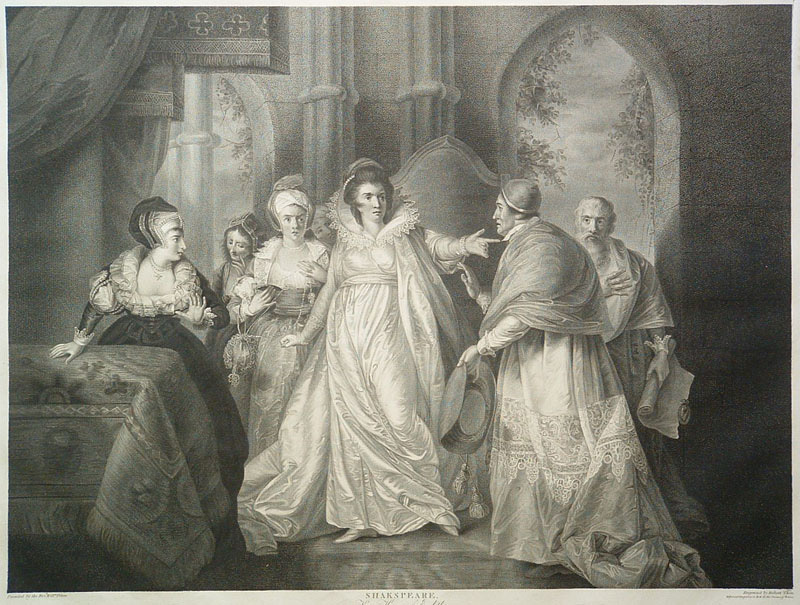
19th, 20th & 21st Century Fine Prints
707-546-7352 · fax 707-546-7924 · web: www.annexgalleries.com · email: artannex@aol.com
Shakespeare Gallery folio, "King Henry the Eighth, Act III, Scene I". As etched by Robert Thew after the painting by Rev. Will Peters. by J. & J. Boydell Publishers

Shakespeare Gallery folio, "King Henry the Eighth, Act III, Scene I". As etched by Robert Thew after the painting by Rev. Will Peters.
J. & J. Boydell Publishers
Shakespeare Gallery folio, "King Henry the Eighth, Act III, Scene I". As etched by Robert Thew after the painting by Rev. Will Peters.
The queen is in her apartment when the arrival of Cardinal Wolsey and Cardinal Campeius is announced. The cardinals request that they speak in a private room, but the queen's conscience is clear, so she is content to converse in a public room. Wolsey says he has not come to accuse her but to learn her thoughts on the dissolution of her marriage and to offer advice. Katharine does not believe that they are on an honorable errand, but she nevertheless voices thanks for their efforts. Katharine declares that she is a woman alone, without friends or hope. Wolsey insists that she does have friends in England, but she disagrees. Campeius advises Katharine to put her hope in the king and to believe that he will yet protect her when they are divorced. Katharine accuses them of being corrupt, and she reminds them that there is still a higher force to judge them, God.
Katharine tells the cardinals that she thought they were holy men, and she is shocked to see their apparent pleasure in making her life wretched. She cannot believe they would advise her to put her future in the hands of one who has already rejected her. The cardinals tell her she is mistaken. But the queen speaks of how obedient and honorable a wife she had been, yet rewarded only with dishonorable divorce. Thus, she says, even being a constant woman and a good wife cannot save a marriage. Katharine says only death will take the title of queen from her. She wishes she had never come to England, a world of flattery and untruth.
Wolsey breaks in to insist that their ends are honorable, that they want to cure her sorrow, and she misunderstands them in thinking evil of them. As peacemakers, they suggest that she not aggravate the break with the king, but try to stay in his good favor. Campeius assures her that the king loves her, and he promises they will try to help her. But Katharine tells them to do whatever they want, declaring sarcastically that if she has misunderstood their intentions, it is because she is a woman, lacking understanding.THE BOYDELL SHAKESPEARE FOLIO included 167 engravings, dating from 1791 to 1803, that were adapted from paintings shown at the Shakespeare Gallery in London in the late eighteenth century. John Boydell (1719 - 1804) was a noted engraver, publisher, print-seller, and even Lord Mayor of London, who established the Shakespeare Gallery and sold to subscribers engravings of the paintings shown there. His nephew, Josiah Boydell, published the collected engravings after John Boydell's death.
